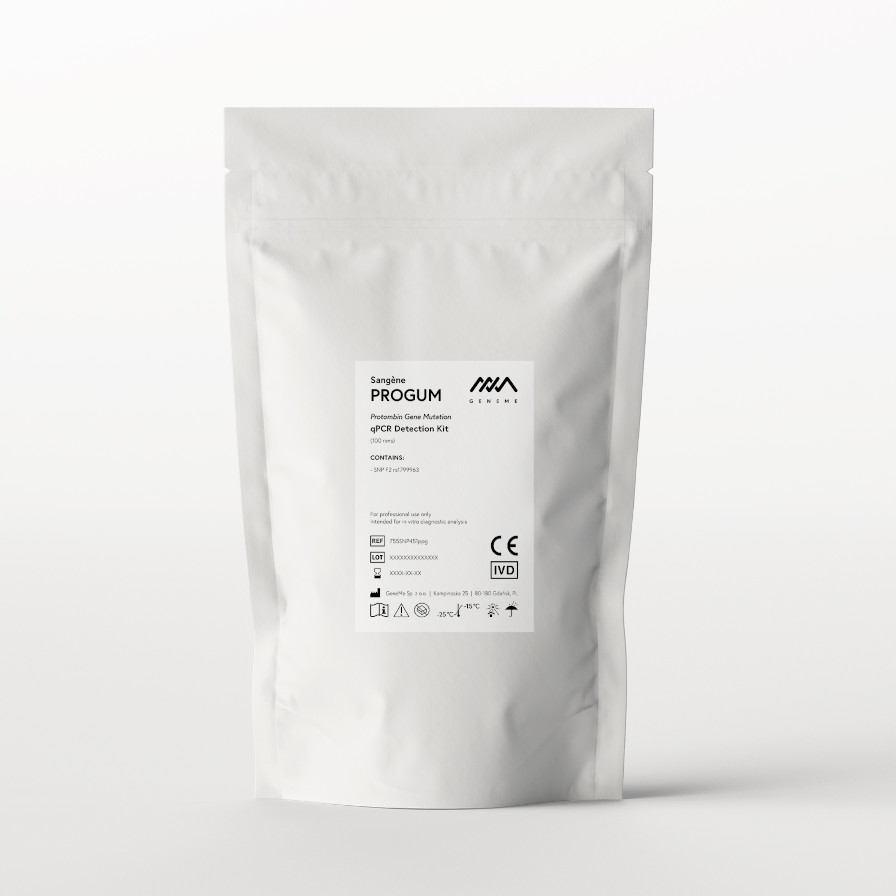PROGUM
(Prothrombin Polymorphism)
qPCR SNP Detection Kit

Description
Analysed gene F2 is responsible for production of prothrombin. Prothrombin is essential in blood clotting, i.e. clot formation. Changes in this gene may have an influence on the genetic predisposition to chromophylls, thromboembolic complications or habitual miscarriages.
REF. NUMBER
755SNP451pgu
PREDISPOSITION
Prothrombin Polymorphism
ANALYSED GENE
F2
IDENTIFIED POLYMORPHISMS
rs1799963
KIT CONTENTS
1 × Nuclease-Free Water
1 × 2xSNP MasterMix
1 × Oligos Set
1 × Positive Control Set
QUANTITY
100 rxns
STORAGE CONDITIONS
-25°C to -15°C
CERTIFICATES
More Information
Did you know...?
Thrombophilia is a congenital (genetically determined) or acquired thromboembolic complications predisposition. The clots that form block the veins, obstructing blood circulation and ischemia. During the disease there is an increased risk of blood clots in the deep veins, mainly in the legs and arms. Pulmonary embolism is also possible. Thrombophilia also causes thrombus formation in the vessels of the abdominal cavity and the venous sinuses of the brain.
What are the symptoms of thrombophilia?
Symptoms of thrombophilia include: during deep vein thrombosis – calf pain when walking, swelling, tenderness, warmth; pulmonary embolism – shortness of breath, chest pain, cough, fainting, sometimes haemoptysis; cerebral venous thrombosis – headaches, nausea, vomiting, visual disturbances, limb paresis, convulsions, disturbances of consciousness.
How the test is performed?
The test is based on the PCR method, which enables precise determination of the genotype and thus the risk of developing thrombophilia. Congenital thrombophilia is caused by genetic mutations, most often in the prothrombin gene (blood coagulation factor II) and factor V. In the course of the study, the polymorphism of the F2 gene is analyzed. The F2 gene is a piece of DNA that contains instructions for building proteins involved in blood clotting.
How will the client benefit?
Interpretation of the obtained results, based on the IFU of the product included in the kit, allows for the preparation of a detailed report containing both the genotype description and recommendations indicating the further diagnostic path. The test we offer is relatively quick, uncomplicated and does not require a lot of work.
Why is it worth doing a genetic test?
The test result will be especially useful for women planning pregnancy. Genotype, where mutation is present, determines the risk of developing congenital thrombophilia and the occurrence of habitual miscarriages. Testing for congenital thrombophilia is recommended, especially after collecting a family history suggesting hypercoagulability problems among related individuals.
What can be done after the test result?
In the case of an unfavorable variant of the gene, it is important to follow the recommendations and consult a doctor. Awareness of the presence of the mutation, i.e. an increased risk of hypercoagulability, will allow for the rapid implementation of anticoagulant therapy and avoid serious complications in the future. It will also help a woman to properly prepare for pregnancy, and the doctor will properly guide her in order to avoid complications.